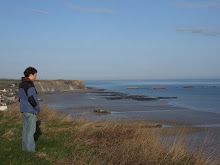Wind power has long been a viable, if controversial, source of renewable energy. The facts that have come to light recently, regarding the state of the US approach to generating energy from its vast “wind reserves” along its two coastlines, are astonishing. Ken Salazar’s revelatory announcement that the winds along these coastlines could more than provide for the whole of the “lower 48 states”, coupled with the fact that most of the United States' data on oil and gas reserves in the Atlantic are 25 years out of date are both unsettling and encouraging. It suggests that new research may be funded, and that possibly this research will be focused in a greener direction.
There has been much talk in recent years of harnessing the geothermal power harbored under Alaska. However, this plan is fraught with other environmental implications, mainly disruption of wilderness and habitats. More palatable is the use of the winds of the mid-West and Western states. 21 million acres of public land in the 11 western states are earmarked for wind power. Solar power also featured in Salazar’s announcements. He pointed out the solar potential of almost 30 million acres in the southwest. These huge numbers, as incomprehensible as those bandied about regarding the current recession, seem encouraging. It remains to be seen how seriously Salazar is taken and how "practical" the Department of the Interior's plans are deemed.
There has been much talk in recent years of harnessing the geothermal power harbored under Alaska. However, this plan is fraught with other environmental implications, mainly disruption of wilderness and habitats. More palatable is the use of the winds of the mid-West and Western states. 21 million acres of public land in the 11 western states are earmarked for wind power. Solar power also featured in Salazar’s announcements. He pointed out the solar potential of almost 30 million acres in the southwest. These huge numbers, as incomprehensible as those bandied about regarding the current recession, seem encouraging. It remains to be seen how seriously Salazar is taken and how "practical" the Department of the Interior's plans are deemed.
This talk is very positive and encouraging. The realization and announcement that the United States’ energy demands could be met by her coastal wind power "reserves", thus removing the dependency on the world’s oil, the US currently consumes 25% of the world’s oil. This represents what Salazar established as a threefold threat to US security. “Our dependence on foreign oil is a national security problem, an environmental security problem, and an economic security problem.” (DOI statement) To remove itself from this position, a position of dependence on nations with whom it has complex political relationships, would be advantageous on two levels. It will allow greater objectivity in her dealings with other nations, as well as cutting the economic dependency ties.
Of course these positive noises about renewable energy could have an impact on other members of the G8 and G20 groups. If the US could become an entirely “sustainable” nation, it would set an incredible precedent for other of the world’s richest nations, so far reticent to develop green energy, to move more of their thinking to sustainability.
It is not the obligation of the US to lead the way. There are countries who could set a standard. But to see this from the world’s greatest economy, and especially such an apparent sea-change from the Bush Administration's isolationist, anti-Kyoto thinking, should serve to encourage other nations to follow suit.
In Britain, there is a movement to harness her vast wind “reserves”. There are plans for 11,000 megawatts of wind turbines to be constructed off the British coast currently under planning consideration that are being hindered by problems of connecting these generators to the grid.
Salazar’s announcements are very encouraging. Cynicism has no place in the resolution of the energy crisis and the environmental pressures of fossil fuels and atomic energy. If what Ken Salazar is suggesting is put into action, big things could happen in the world. The US could remove itself as a customer of the Middle East and perhaps deal more objectively with the complex political situations which reside there.
He made some brave and sweeping statements and we must wait and see, unfortunately, as with so much, these things will take time. But it is possible that the “moon-shot on [American] energy independence” is finally in its nascent stages. There are very positive noises emanating from the department of the interior.
That’s not to suggest that green energy will save the world, but perhaps it’s a step in the right direction.
Here’s hoping!


